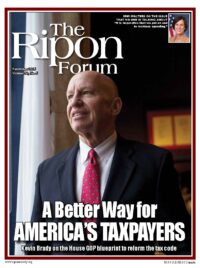
A McKenna Research Poll taken at the height of terrorism fears found that, by a 50-32 percent margin, Americans worried more about “receiving an audit notice from the IRS in the mail” than “receiving anthrax in the mail.” This is but one artifact testifying to Americans’ historical concern over how we should administer taxes, beyond how we should structure taxes.
These two considerations are interrelated: an analysis from the National Taxpayers Union’s research arm calculated that the federal income tax demanded 6.1 billion hours and $234.4 billion in compliance costs – and both will rise by one-third in the near future. Such complexity begets far-reaching administrative, investigative, and enforcement powers.
Despite decades of delays over systemic tax reform, a success story has been four bipartisan “Taxpayer Bill of Rights” laws that have gradually built some protections from IRS excesses. These initiatives, (in 1988, 1996, 1998, and 2015), have, for example, created a National Taxpayer Advocate’s office to meaningfully assist citizens, established limited remedies for wronged taxpayers through the courts, and prescribed fairer procedures for collection activities. Yet progress has been uneven in a number of key areas, including:
An analysis from the National Taxpayers Union’s research arm calculated that the federal income tax demanded 6.1 billion hours and $234.4 billion in compliance costs.
Overzealous Enforcement – While the majority of IRS staff has not acted abusively, the level of incidents against taxpayers, especially during the 1980s and 1990s, would not have been tolerated from other law enforcement arms. Thomas Treadway testified to Congress that he lost his business due to a $247,000 IRS assessment – one that was later thrown out on appeal. The agency even went as far as to seize $22,000 from his girlfriend’s bank account. Kay Council described how her husband was driven to suicide after an IRS audit of their business ultimately racked up a tax bill of over $300,000. She prevailed in court after spending some of the proceeds from Mr. Council’s life insurance policy on legal representation. Other suicides were brought to the attention of Congress, along with armed IRS raids and auditors threatening to ruin taxpayers over minor issues.
While accounts such as these are rarer today, the House Ways and Means Committee recently revealed more than 600 cases involving over $40 million of seized funds from “individuals and families who have been forced to forfeit their assets even though they have not been proven guilty of any crimes.” They were targeted only because they engaged in certain “patterns” of cash-based transactions.
Intrusive Examinations – Although formal audits were conducted on just 0.7 percent of all tax returns in 2015, the IRS utilizes many methods to scrutinize taxpayers. That same year, the agency received 2.6 billion “information returns” from third parties such as employers and investment brokers, and issued 1.68 million math error notices.
Lately, the agency has been applying special enforcement and summons powers normally reserved for precedent-setting or exotic tax shelter cases to more routine corporate audits, and even contracted with the high-priced law firm of Quinn Emanuel to assist with a sensitive corporate examination. These alarming procedures could be readily adapted for taxpayer examinations outside the corporate sphere.
Politicization – Well before the Lois Lerner scandal made headlines, the Nixon Era’s infamous Operation Leprechaun was targeting opponents of the President. Under LBJ and JFK, special IRS units like the Ideological Organization Project pursued war protesters and “un-American” right-wing groups alike with microscopic tax investigations. Today, battles are being fought over matters such as privacy of donors to nonprofits.
Bureaucratic Breakdowns – The IRS’s “Tax Filing Season from Hell” in 1985, which resulted from several botched computer modernization projects, generated millions of erroneous tax due notices, delayed refunds, and lost taxpayer records. Other debacles would follow. Last year, over 700,000 people’s tax records were breached, ironically, by thieves who hacked into the IRS’s own identity theft resolution service.
The good news is that help in these and other areas may be on the way.
The good news is that help in these and other areas may be on the way. The House GOP’s tax reform blueprint envisions reorganizing the IRS into individual and business service units, backed by an independent small claims court to expedite problem resolutions. Other practical, constructive steps beckon.
According to the National Taxpayer Advocate, the IRS has for many years failed to follow a law requiring the agency to annually report on sources of complexity in the Tax Code, as well as to liaison more effectively with Congress. Rectifying both these situations would encourage more staff-level cooperation on improving the system for taxpayers.
The 1998 taxpayer rights law created an independent Oversight Board that would keep the IRS on track with management and strategic planning matters. The Board has been inactive for nearly two years because a spat between the Administration and the Senate has held up Board nominees. The Senate should act on these nominees or craft a new oversight mechanism, rather than pretend the Board doesn’t exist.
Additional bills also deserve swift enactment. For example, Senator Rob Portman introduced legislation (S. 2809) to create new audit safeguards such as guaranteeing a taxpayer’s appeal prerogatives. Along similar lines, Senator John Cornyn’s Small Business Taxpayer of Rights (S. 949) would establish an innovative “alternative dispute resolution” for tax cases. And Senator Charles Grassley’s Taxpayer Bill of Rights Enhancement Act (S. 1578) definitely lives up to its name.
Whatever direction tax reform takes, it is vital to ask questions about its administrative impact. Our economic efficiency, civil liberties, and tradition of limited, accountable government all depend on finding the right answers.
Pete Sepp is President of National Taxpayers Union (ntu.org), a non-partisan citizen group founded in 1969 to work for limited government and economic freedom. NTU worked intensely with stakeholders inside and outside of government on all four taxpayer rights laws mentioned above, and in 1997 served on the 13-member National Commission on Restructuring the IRS.




